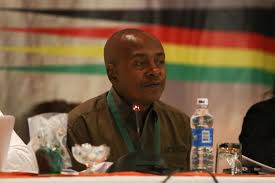By Byron Mutingwende
The involvement of the government in reducing emissions from deforestation and forest degradation in developing countries (REDD+) will complement efforts by the private sector players and non-governmental organisations in bringing tangible benefits to communities.
Speaking at a meeting to assess the potential impact of government involvement in REDD+ in Harare yesterday, Chief Chapoto from Kanyemba in Mbire District, where a private investor, Carbon Green Africa works in, said government involvement would provide a benchmark for sharing proceeds from the projects.
“Although government will embark on a pilot REDD+ project in the Hwange Sanyati Biodiversity Corridor (HSBC), their involvement will give a guideline on how to share profits from the carbon sales. The good thing is that the national committee came to tour the Kariba REDD+ project recently and will improve on the identified strength and weaknesses for the benefit of the communities,” Chief Chapoto said.
There were concerns raised about the possibility of a lack of transparency in REDD+ initiatives by the private implementers in the signing of contracts with rural district councils for the benefit of the communities through the conservation of forests and woodlands.
The Director of Climate Change in the ministry of Environment, Water and Climate, Washington Zhakata reiterated the need to put in place mechanisms that would make it possible for REDD+ projects to benefit communities through the signing of fair and equitable contracts between investors and rural district councils or the local leadership bodies so that communities would not be vulnerable to investors who might not plough back the profits for their selfish motives.
Environment Africa country director for Zimbabwe, Barnabas Mawire said that rural district councils needed education and training on the REDD+ issues to cushion them from being ripped off by greedy investors. Challenges in the implementation of REDD+ projects include the uncertainty on the long-term demand for REDD+ credits and a lack of regulatory and policy frameworks hence the establishment of a national project will provide a mechanism to address capacity gaps.
In October 2008, the Government of Zimbabwe signed to the United Nations Framework Convention on Climate Change (UNFCCC). The UNFCCC is an international environment treaty whose objective is to stabilize greenhouse gas concentrations in the atmosphere at a level that would prevent dangerous anthropogenic interference with the climate system.
The convention commits nation states to embark on climate change mitigation initiatives which contribute to the reduction in the effects of climate change. The REDD+ (reducing emissions from deforestation and forest degradation) is one climate change mitigation mechanism which the government of Zimbabwe is currently pursuing. However, private investors have already started to exploit the REDD+ mechanism and the benefits that comes with it. REDD+ has over the years become a methodology to improve cash flows to communities in return for conservation related behaviour.
It is also now widely recognized as a key global initiative to mitigate climate change. Although REDD+ programs in Africa and specifically Zimbabwe, are still in their initial design phases, considerable financial resources have already begun to flow to them, with the expectation of more to come.
“These anticipated financial flows make national REDD+ programmess potential targets for corruption. While national-level corruption is an important consideration, it is not the only level where corruption must be addressed. Ultimately, the locus of REDD+ policy implementation and benefits delivery will be the local level, with local actors [Rural District Councils, Councilors, Traditional Leaders, Village Headmen e.t.c) carrying out the majority of financial transfers. Thus, local processes and local institutions will play a large part in determining the extent of REDD+ corruption,” said Nqobani Tshabangu, Community Mobilisation and Advocacy Unit Programme Officer of Transparency International Zimbabwe.
In January 2014, TI-Z embarked on the REDD+ Integrity Project (REDD+ IN) to make sure that the concerned citizens and stakeholders are better able to engage in REDD+ policy development, implementation and monitoring, and demand public accountability.
They also seek to make the victims and witnesses of corruption in REDD+ projects are able to articulate and find solutions to their grievances through anti-corruption complaints mechanisms.
TIZ seeks to make sure that public and private sector actors at all levels are more responsive to and better able to identify and engage in targeted governance reforms to enable the effective implementation and enforcement of REDD+ by preventing corruption and ensuring transparency, accountability and integrity.
The work that TI Z is doing on REDD+ and climate financing has opened up new opportunities to mainstream values of transparency, accountability and integrity in forestry issues, wildlife crime and corruption and climate adaptation initiatives. The organisation has placed itself as a major actor in advocating for transparency in climate change and other natural resource governance initiatives. This positioning is bound to create potential fundraising opportunities. More importantly climate finance governance is still a relatively new subject in Zimbabwe’s climate discourse, hence TI Zimbabwe‘s expertise is of utmost importance.
